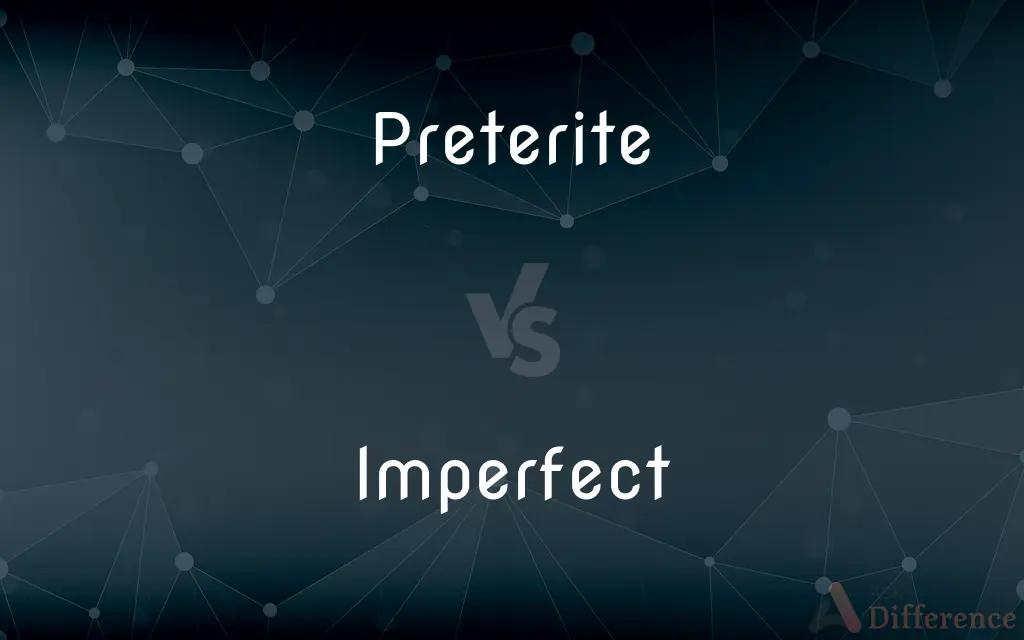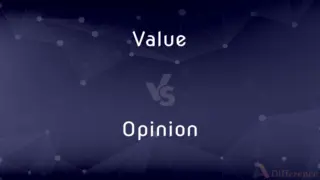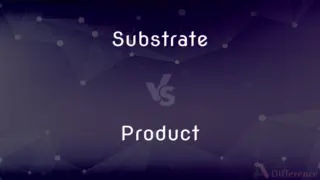Preterite vs. Imperfect — What's the Difference?

Difference Between Preterite and Imperfect
ADVERTISEMENT
Compare with Definitions
Preterite
The preterite or preterit (; abbreviated PRET or PRT) is a grammatical tense or verb form serving to denote events that took place or were completed in the past. In general, it combines the perfective aspect (event viewed as a single whole; it is not to be confused with the similarly named perfect) with the past tense, and may thus also be termed the perfective past.
Imperfect
The imperfect (abbreviated IMPERF) is a verb form that combines past tense (reference to a past time) and imperfective aspect (reference to a continuing or repeated event or state). It can have meanings similar to the English "was walking" or "used to walk." It contrasts with preterite forms, which refer to a single completed event in the past.
Preterite
Of, relating to, or being the verb tense that describes a past action or state.
Imperfect
Not perfect.
Preterite
The verb form expressing or describing a past action or condition.
ADVERTISEMENT
Imperfect
(Grammar) Of or being the tense of a verb that shows, usually in the past, an action or a condition as incomplete, continuous, or coincident with another action.
Preterite
A verb in the preterite form.
Imperfect
(Botany) Having either stamens or a pistil only. Used of a flower.
Preterite
Showing an action at a determined moment in the past.
Imperfect
Not reproducing sexually. Used of fungi.
Preterite
Belonging wholly to the past; passed by.
Imperfect
(Law) Potentially unenforceable; limited or defective
An imperfect right of self defense.
Preterite
(grammar) A grammatical tense or verb form serving to denote events that took place or were completed in the past.
Imperfect
A piece of merchandise having a minor flaw that does not impair its use, usually sold at a discount.
Preterite
Same as Preterit.
Imperfect
The imperfect tense.
Preterite
A term formerly used to refer to the simple past tense
Imperfect
A verb in the imperfect tense.
Imperfect
Not perfect
Imperfect
(botany) unisexual: having either male (with stamens) or female (with pistil) flowers, but not with both.
Imperfect
(taxonomy) known or expected to be polyphyletic, as of a form taxon.
Imperfect
(obsolete) lacking some elementary organ that is essential to successful or normal activity.
Imperfect
(grammar) belonging to a tense of verbs used in describing a past action that is incomplete or continuous
Imperfect
Something having a minor flaw
Imperfect
(grammar) a tense of verbs used in describing a past action that is incomplete or continuous
Imperfect
(transitive) to make imperfect
Imperfect
Not perfect; not complete in all its parts; wanting a part; deective; deficient.
Something he left imperfect in the state.
Why, then, your other senses grow imperfect.
Imperfect
Wanting in some elementary organ that is essential to successful or normal activity.
He . . . stammered like a child, or an amazed, imperfect person.
Imperfect
Not fulfilling its design; not realizing an ideal; not conformed to a standard or rule; not satisfying the taste or conscience; esthetically or morally defective.
Nothing imperfect or deficient leftOf all that he created.
Then say not man's imperfect, Heaven in fault;Say rather, man's as perfect as he ought.
Imperfect
The imperfect tense; or the form of a verb denoting the imperfect tense.
Imperfect
To make imperfect.
Imperfect
A tense of verbs used in describing action that is on-going
Imperfect
Not perfect; defective or inadequate;
Had only an imperfect understanding of his responsibilities
Imperfect mortals
Drainage here is imperfect
Imperfect
Having the attributes of man as opposed to e.g. divine beings;
I'm only human
Frail humanity
Share Your Discovery

Previous Comparison
Value vs. Opinion
Next Comparison
Substrate vs. Product













































